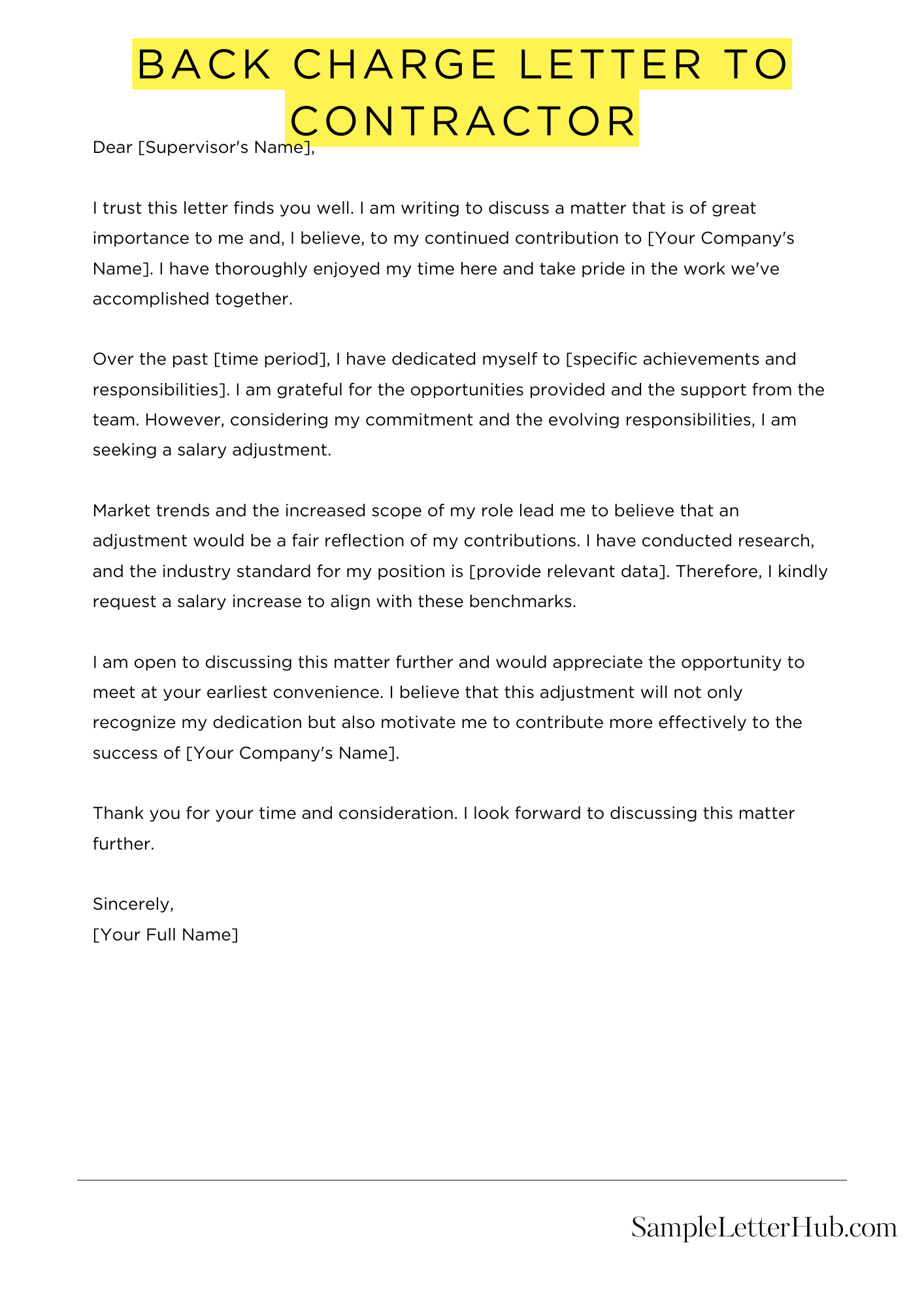A back charge letter to contractor is a formal document sent by a contractor to another contractor or subcontractor to request reimbursement for additional costs incurred due to the latter’s errors or breaches of contract. It serves as a means of recovering expenses and holding the responsible party accountable for their actions.
In this article, we will provide a comprehensive collection of templates, examples, and samples of back charge letters to contractors. These resources will guide you in drafting a clear and effective letter that outlines the specific charges, supporting documentation, and legal basis for your claim. By utilizing these templates, you can streamline the process of writing a back charge letter and ensure that your request for reimbursement is presented in a professional and persuasive manner.
Back Charge Letter to Contractor
Dear [Contractor’s Name],
I am writing to inform you of a back charge for the following services rendered to rectify the defective work performed by your company on the [Project Name] project.
As per the contract agreement, your company was responsible for [List of services]. However, upon inspection, it was discovered that the work was not completed to the agreed-upon specifications.
Specifically, the following deficiencies were identified:
* [List of deficiencies]
To correct these deficiencies, we incurred the following costs:
* [List of costs]
We have attempted to resolve this issue amicably with you, but have been unable to reach a satisfactory agreement. Therefore, we are left with no choice but to issue this back charge.
Please remit the amount of [Total Back Charge Amount] to our office within 14 days of receipt of this letter. Failure to do so may result in further action, including legal proceedings.
We value our business relationship with you and hope that we can resolve this matter amicably. However, we must protect our interests and ensure that the work performed on our projects meets the highest standards.
Thank you for your attention to this matter.
Sincerely,
[Your Name]

How to Write Back Charge Letter To Contractor
A back charge letter is a formal document sent by a contractor to a client or subcontractor to request reimbursement for additional costs incurred due to the other party’s actions or omissions.
1. Identify the Project and Contract
Begin the letter by clearly identifying the project and contract in question. Include the project name, contract number, and date.
2. State the Reason for the Back Charge
Explain in detail the reason for the back charge. Be specific about the actions or omissions that led to the additional costs.
3. Quantify the Costs
Provide a detailed breakdown of the additional costs incurred. Include invoices, receipts, or other supporting documentation to substantiate your claim.
4. Request Reimbursement
Clearly state the amount of reimbursement you are requesting and the payment terms you expect.
5. Provide Supporting Evidence
Attach any relevant documentation that supports your claim, such as emails, meeting minutes, or inspection reports.
6. Set a Deadline for Payment
Establish a reasonable deadline for the client or subcontractor to respond to your request. This deadline should allow sufficient time for them to review your claim and make a decision.
7. Legal Considerations
If the back charge is substantial or the other party disputes your claim, it may be necessary to consult with an attorney to ensure your rights are protected.
FAQs about Back Charge Letter To Contractor
What is a back charge letter to a contractor?
A back charge letter to a contractor is a formal document that outlines the costs that a business is seeking to recover from a contractor due to the contractor’s failure to fulfill their contractual obligations.
What are the most common reasons for issuing a back charge letter?
The most common reasons for issuing a back charge letter include:
- Defective or incomplete work
- Delays in project completion
- Additional costs incurred due to the contractor’s negligence or errors
What should be included in a back charge letter?
A back charge letter should include the following information:
- A detailed description of the costs being claimed
- Documentation supporting the costs, such as invoices, receipts, or time sheets
- A clear explanation of how the contractor’s actions led to the additional costs
- A demand for payment of the back charges within a specified time frame
What are the potential consequences of issuing a back charge letter?
Issuing a back charge letter can have several potential consequences, including:
- Damage to the relationship between the business and the contractor
- Legal action if the contractor disputes the back charges
- Negative publicity for the contractor
How can I avoid issuing a back charge letter?
There are several steps that businesses can take to avoid issuing back charge letters, including:
- Establishing clear contractual terms and expectations
- Communicating regularly with the contractor throughout the project
- Documenting all interactions with the contractor
- Taking prompt action to address any issues that arise

